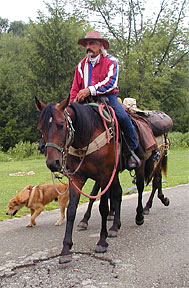
Across America on Horseback
The Answers You Gave Me
-Doc Mishler
 In 2002, Lawrence “Doc” Mishler, a former professor, mountain guide, and cancer survivor, sold his land and belongings and set out on horseback across the United States to call for an end to world hunger.
In 2002, Lawrence “Doc” Mishler, a former professor, mountain guide, and cancer survivor, sold his land and belongings and set out on horseback across the United States to call for an end to world hunger.
“Every single day twenty-five thousand children die of hunger and hunger-related illnesses,” he says. “Every four seconds the light in a child's eyes goes out. This is unacceptable. If we can spend $100 billion destroying people, we can spend $50 million to feed people.
“When I am asked why I ride, as I often am, I say I love riding and living deliberately because I too will die. But if you wish to help, please send your support to help feed one of those twenty-five thousand children.”
For two years and 5000 miles - from Montana to Washington, D.C., by way of California and Crawford, Texas - Mishler, his dog, and his two Tennessee Walkers averaged ten miles a day. He stopped wherever he found hospitality. “I had mapped it all out, but then I talk to people along the way and they always know a better way. Now I’ve put the maps away and just listen to the people."
And listen he has. Wherever his horse stopped, he asked people about some of Jesus’ most neglected teachings. What follows is Doc Mishler's summary of the excuses we gave.
Jesus said, “You have heard that it was said, ‘An eye for an eye and a tooth for a tooth.’ But I tell you not to resist an evil person” (Matt. 5:38-39). “Give to the one who asks you, and do not turn away from the one who wants to borrow from you” (Matt. 5:42). “Give the hungry food...” (Matt. 25:31-46)
On my journey by horseback from Montana to Washington, D.C., by way of California, I wondered how seriously we take the gospel of Jesus Christ after September 11, 2001. Or as my Jewish friends would say, “How seriously do we take that good Jewish boy Jesus.” The best way of concentrating on that question is, I think, to face the book of Matthew and ask: For whom is the Sermon on the Mount intended? To whom does it apply? What is the purpose of this sermon, and what is its relevance today? In your own words, what did Jesus say in Matthew 25:31-46?
Every Sunday for two years, over 5000 miles by the grace of the Great Spirit, I let my mare, Faith, take me to whatever church she walked to following my dog Czarbear or Gooddog and asked the above questions. I also handed out hundreds of papers with the questions on them whenever I stopped, asking people to respond by email. This article is a summation of your answers.
After asking these questions of the people, and clergy of different faiths and denominations, I find five typical criticisms of Jesus and active nonviolence.
First, some of us assert that state violence does not contradict Christ’s teachings, believing that government is not bound by Jesus’ commands about humility, forgiveness, and love of enemies. We simply quote Biblical passages to our liking and ignore the essence of the teachings. Somehow we forget that we the people are the government.
Second, we feel turning the other cheek and giving up one’s shirt is too high a moral demand for this world. If force were not used to stop evildoers they would destroy all the good people. However, this argument destroys the Christian teachings because true Christians do not wish to judge evildoers, nor do they consider themselves capable of judging accurately, nor would they be able to execute punishment.
We fear death because we have so little faith, and yet Jesus promises eternal life. By the grace of God, living each day come what may for over two years, I waited upon the Lord and prayed, “Go ahead, make my day.” And I found that where “Faith” walks in, fear runs away. Each day was a new adventure. My daily bowl overflowed and everything I needed was provided.
The third argument is that although one ought not defend oneself, one ought to defend one’s neighbors. This still contradicts Christ’s teachings; Jesus did not allow his disciples to defend him because the violence used to defend against threatened violence may be even worse, since we never know what will result beforehand. We can learn what Jesus would do by what he did when he had the superior power. Only God is omnipotent and he said resist not evil and feed the hungry. Jesus is the ultimate example of how good overcomes evil.
Fourth, theologians and defenders of the church and state consider violations of non-resistance as justifiable under certain circumstances - such as “just wars” (slaughters) declared or undeclared and executions - yet they do not try to justify the breaking of other commandments, such as those against fornication, adultery, or lust.
Many clergy claim, “Thou shall not kill means thou shall not murder.” They say suicide bombers and terrorists murder (unlawfully kill), whereas governments using military force kill lawfully. Everyone agrees that nations have a right to defend themselves. But contrast how Jesus, in the New Testament, admonishes his followers: “Whoever strikes you on the right cheek, turn to him the other also.” And he urges them to “love your enemies.” Of course (as students of history know) in practice we Christians have widely ignored Jesus’ message. Ever since we obtained military power, we have enthusiastically slaughtered one another and “evildoers”.
 One reason why many of us ignore non-resistance (active nonviolence) is because many preachers do not recognize it and even avoid preaching on the Sermon on the Mount. (To recognize active nonviolence might be considered unpatriotic, especially after 9/11, and definitely not economically profitable. I have seen membership decrease after preachers started preaching the Sermon on the Mount. Membership translates to money, and not necessarily a relationship with God. We cannot serve two masters.) Much of what passes for Christianity is a negation of the Sermon on the Mount.
One reason why many of us ignore non-resistance (active nonviolence) is because many preachers do not recognize it and even avoid preaching on the Sermon on the Mount. (To recognize active nonviolence might be considered unpatriotic, especially after 9/11, and definitely not economically profitable. I have seen membership decrease after preachers started preaching the Sermon on the Mount. Membership translates to money, and not necessarily a relationship with God. We cannot serve two masters.) Much of what passes for Christianity is a negation of the Sermon on the Mount.
The fifth and most used device was merely to ignore the questions and criticize active nonviolence for being one-sided or extreme. Those who ignore the questions are the hardest to reach because they are not willing to discuss the issue and assume they are right without any justification whatsoever, being under some kind of “hypnotic suggestion,” controlled by mob rule. The nature of the evil lies in our cooperation with the mob. We can choose to ignore the Holy Spirit but he will never leave us!
Jesus knew that many of us whom he expressed his love for would continue to ignore and reject his word. Oh, yes, we know all about the doctrine of grace and forgiveness, and we are looking to Christ. But here in these documents, which we claim to be authoritative, is this sermon. Where does it come in our scheme? The Sermon on the Mount is a description of what Christians, Jews, Muslims, and others (Jesus was speaking to all; God is all and in all) are meant to be. I found on this journey that, though sinners we are, we all believe we obey God’s word, even as our nation ignores Jesus’ message and repeats history.
We, the people, should all struggle and suffer in order to understand more fully and obey more perfectly the word of God as we extend our prayers, spiritual nurture, and material aid to each other in these difficult times. God wants to help through the people. We are weak and God is strong. All things are possible through the Lord. We can feed the hungry children of all, and realize that we will never have peace as long as we keep killing each other’s children.
The original teachings of Christ transcend the social conception of love, which may be limited to exclusive love of one’s family, church family, tribe, nation, race, or even humanity. These social brotherhoods are based on love of personality, but Christian love expands because it is based on the love of God.
After riding on horseback for over two years and listening to the people as they answered the questions I stated above, I find five ideals and commandments of Christ expressed in the book of Matthew outlined here as a precursor to future ridings and writings:
1) Have no ill-will against anyone, but love all. Don’t even offend with a word.
2) Feed the hungry.
3) Live only in the present and don’t worry about the future. Don’t swear and don’t promise.
4) Never use violence nor repay evil with evil, but suffer insult and give up possessions.
5) Love our enemies and those who hate us by treating them as ourselves.
This article was provided by Bruderhof.com
return to LiberalWare.com


 In 2002, Lawrence “Doc” Mishler, a former professor, mountain guide, and cancer survivor, sold his land and belongings and set out on horseback across the United States to call for an end to world hunger.
In 2002, Lawrence “Doc” Mishler, a former professor, mountain guide, and cancer survivor, sold his land and belongings and set out on horseback across the United States to call for an end to world hunger. One reason why many of us ignore non-resistance (active nonviolence) is because many preachers do not recognize it and even avoid preaching on the Sermon on the Mount. (To recognize active nonviolence might be considered unpatriotic, especially after 9/11, and definitely not economically profitable. I have seen membership decrease after preachers started preaching the Sermon on the Mount. Membership translates to money, and not necessarily a relationship with God. We cannot serve two masters.) Much of what passes for Christianity is a negation of the Sermon on the Mount.
One reason why many of us ignore non-resistance (active nonviolence) is because many preachers do not recognize it and even avoid preaching on the Sermon on the Mount. (To recognize active nonviolence might be considered unpatriotic, especially after 9/11, and definitely not economically profitable. I have seen membership decrease after preachers started preaching the Sermon on the Mount. Membership translates to money, and not necessarily a relationship with God. We cannot serve two masters.) Much of what passes for Christianity is a negation of the Sermon on the Mount.